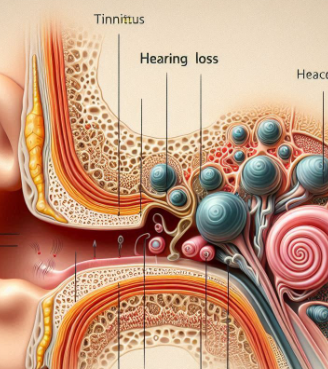If you are wondering whether hearing loss and tinnitus are the same, you have come to the right place.
Hearing loss means you can’t hear sounds as well as others. It can range from mild (trouble hearing soft sounds) to severe (difficulty hearing even loud noises).
There are many causes, including aging, exposure to loud noises, infections, and ear injuries. I’ll share my personal story a bit later in this section.
Different things can lead to hearing loss. When you get older, the tiny hair cells in your inner ear can get damaged and stop working well. Loud sounds, like music or machinery, can also hurt these cells. Some infections or injuries to the ear might also cause problems.
Hearing loss is quite common.
Many people, especially when they get older, notice they don’t hear as well as they used to. Recognizing the signs early is important to get help and improve your quality of life. Feeling isolated or having trouble in conversations can signal you need a hearing check.
I’m a pharmacist who faced hearing loss myself. One day, I realized I wasn’t catching what my patients were saying. It felt frustrating and isolating.
Getting diagnosed was just the first step. Learning how to live with it, and finding the right tools and support, made a world of difference. This personal journey helped me understand my patients better.
What is Tinnitus?
Tinnitus is a ringing, buzzing, or hissing sound in the ears that isn’t caused by an outside source. It can be continuous or come and go. Tinnitus isn’t a disease by itself but is usually a symptom of an underlying condition.

Symptoms can vary widely. Some people hear a low hum, while others hear a high-pitched ring. This can be constant or fluctuate, making it hard to concentrate or sleep. It can affect one or both ears and may be louder at times.
Many factors can cause tinnitus. Exposure to loud noises often leads to this condition. Ear infections and injuries can also play a part. Sometimes, it’s related to hearing loss, making it a double challenge for those affected. Medical conditions like high blood pressure or diabetes can contribute too.
Living with tinnitus can be tough. As someone who already experienced hearing loss, it was even more challenging for me. The constant noise in my ears felt overwhelming and distracting.
However, there are ways to manage it, which I’ll cover in the next sections. It’s important to seek help if you’re struggling with tinnitus so you can find the right strategies and support.
Differences Between Hearing Loss and Tinnitus
Hearing loss and tinnitus are often mentioned together, but they aren’t the same. Hearing loss is about the ability to hear sounds clearly, while tinnitus involves hearing noises that aren’t there.

These conditions can happen together but are different issues. Hearing loss affects the volume and clarity of sounds around you, making it hard to follow conversations or enjoy music. Tinnitus, on the other hand, adds unwanted sounds, like ringing or buzzing, to your hearing experience.
One key difference: hearing loss often gets worse over time, especially with age or continued noise exposure. Tinnitus can come and go, change in intensity, or remain constant. This unpredictability can make it more stressful for those who experience it.
It’s not unusual to have both conditions.
In my case, dealing with hearing loss was already hard, and then tinnitus showed up, adding another layer of difficulty. This double challenge needs a unique approach to management and treatment. Combining strategies from both conditions can help in finding some relief.
Understanding these differences helps in seeking proper treatment.
While hearing aids are common for hearing loss, tinnitus might require different tactics like sound therapy or relaxation techniques. Navigating these conditions with the right knowledge and tools makes a real difference.
Managing Life with Hearing Loss and Tinnitus
Dealing with hearing loss involves finding the right aids and tools.
Modern hearing aids don’t just amplify sound; they filter out background noise and make conversations clearer.

Regular check-ups with an audiologist ensure your devices are always optimized. Simple steps like avoiding loud environments and wearing ear protection can prevent further damage.
For tinnitus, there are several strategies available.
Sound therapy uses white noise machines or special apps to help mask the ringing. Relaxation techniques like meditation and deep breathing can help manage the stress it brings.
Reducing caffeine and managing stress can also reduce the intensity of tinnitus.
Coping with both conditions can feel overwhelming. Combining strategies for each condition helps.
I use hearing aids to improve my hearing and sound therapy to manage tinnitus. Keeping a journal of what makes symptoms worse or better provides insights into managing daily life more effectively.
My background as a pharmacist has given me an edge in managing these conditions. Understanding medications that might affect hearing and knowing about the latest treatments helps me stay on top of my health.
It’s all about finding the right balance and seeking support when needed. Talking to healthcare professionals for personalized advice can make your journey easier and more manageable.
How is your journey going so far? Are you suffering from a hearing loss or tinnitus or both?
Looking forward to hearing from you.
Kind Regards and Take Care
Roopesh

Tinnitus is a terrible thing, and there is not a lot the doctors can do in a lot of cases, except manage it as best they can. My Mom in Law has had it for years and it has been a great source of frustration for her. Now as she is even older, her hearing has also started going, so she is not coping well. She refuses to get a hearing aid, so it is also stubbornness on her part, but I am going to show her this article and try and change her mind.
I know exactly how your mum-in-law feels. Sorry to hear about her hearing going down as well. Yes, please show her this article, and tell her that she is free to contact me whenever she wants to talk.
All the best.
Roopesh